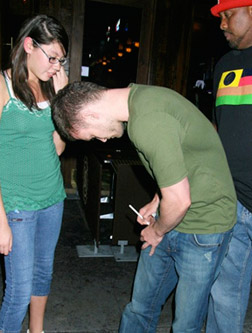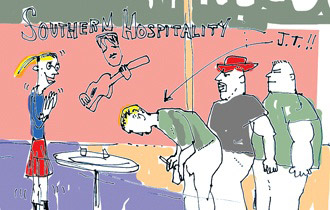Don’t Drink The Creek Water: JT’s Southern Hospitality
29.12.07
 Southern Hospitality is a Memphis-style barbeque restaurant/bar co-owned by the 26-year-old pop star Justin Timberlake. This isn’t his first crack at the food biz. Inside LA’s Hyatt West Hollywood there was Chi Restaurant and Lounge, a dim-sum joint venture between Timberlake and brothers/bar owners Art and Allan Davis. “There’s an indoor and outdoor patio with waterfalls, with seating areas around the waterfalls,” Allan explained to MTV almost four years ago. In 2005, Timberlake was reported to have vomited at the bar. Quoth Yelp: “Justin Timberlake’s Club Ain’t Justified!” Chi closed by year’s end. Late December 2005, TImberlake announced he was backing Destino, a semi-fancy Italian restaurant in midtown New York with Eytan Sugarman, a self-made man apparently life-coached gratis by baseball’s Tommy Lasorda. In a 2002 partnership with hip-hop’s Timbaland, Sugarman had opened Suede, a Chelsea club that closed in 2006. Timberlake’s Destino is still around––that said, click on “OWNERS” and all you’ll see is “COMING SOON.” Encouraged by the lack of failure, Sugarman and Timberlake teamed up with JT’s childhood bud Trace Ayala for Southern Hospitality, which opened July 2007, which borrows its vibe from Timberlake’s hometown Memphis and steals its dessert recipes from Timberlake’s own grandmother. Recommendations from Justin: “fried green tomatoes and the pulled pork.”
Southern Hospitality is a Memphis-style barbeque restaurant/bar co-owned by the 26-year-old pop star Justin Timberlake. This isn’t his first crack at the food biz. Inside LA’s Hyatt West Hollywood there was Chi Restaurant and Lounge, a dim-sum joint venture between Timberlake and brothers/bar owners Art and Allan Davis. “There’s an indoor and outdoor patio with waterfalls, with seating areas around the waterfalls,” Allan explained to MTV almost four years ago. In 2005, Timberlake was reported to have vomited at the bar. Quoth Yelp: “Justin Timberlake’s Club Ain’t Justified!” Chi closed by year’s end. Late December 2005, TImberlake announced he was backing Destino, a semi-fancy Italian restaurant in midtown New York with Eytan Sugarman, a self-made man apparently life-coached gratis by baseball’s Tommy Lasorda. In a 2002 partnership with hip-hop’s Timbaland, Sugarman had opened Suede, a Chelsea club that closed in 2006. Timberlake’s Destino is still around––that said, click on “OWNERS” and all you’ll see is “COMING SOON.” Encouraged by the lack of failure, Sugarman and Timberlake teamed up with JT’s childhood bud Trace Ayala for Southern Hospitality, which opened July 2007, which borrows its vibe from Timberlake’s hometown Memphis and steals its dessert recipes from Timberlake’s own grandmother. Recommendations from Justin: “fried green tomatoes and the pulled pork.”
Not to slack: You don’t need me to tell you that the food here was pretty awful, do you? You don’t need me to tell you that the babyback ribs were bone-dry, that the sauce didn’t smother the meat so much as sit on top of it, some real microwave-quality stuff––right? Maybe you could imagine a sucker like me dropping nine bucks on Maker’s neat––but do you really need me to break down the rum-to-iced tea ratio in their group specialty cocktail known as Creek Water? The fried green tomatoes and the fried pickles tasted identical, flat––nothing fresh or sweet or tart on the inside to balance out the salty deep-frier. Beans, which came with almost every dish, swam flavorless in their own preservative liquid. Mac-and-cheese, a dish I didn’t realize could not taste delicious, was remarkably uneventful––not poorly made, but the cheeses themselves were bland, unsturdy. There is no point in discussing the waitress’s face, is there, or in mentioning, even ironically, that Justin himself was M.I.A..
Or is there? Timberlake’s absence, or the extent of his absence, stuck out most. You won’t see his name on the menu or punned on for the cocktail list (e.g. “Sex on the ‘Lake”), won’t hear his songs on the speakers (you will hear “Mary Jane’s Last Dance”), won’t find his mug up on the wall among photos of other Memphis heroes (Elvis has a whole dot-matrixed wall to himself, protected behind glass). The restaurant’s storefront, on the east side of Second Avenue between 76th and 77th Streets, might be the darkest on the block: Budweiser, Sierra Nevada, Coors Light neons provide some color, but the place’s sign, written in one of those small-caps fonts you’d recognize in an MS Word drop-down if you saw it, it might as well be called “Restaurant Font,” had zero exterior illumination. Hanging much more prominently above that sign though were two huge eye-catching banners. One read “CENTER FOR MOVEMENT”; the other “PILATES.” I actually didn’t see the restaurant until I had crossed the street, then had to cross back.
Granted, Timberlake could count on the secret-hungry press to get the word out about his restaurant, located way up in that capitalist crownstone the Upper East Side, without being too loud about it––without (say) making the storefront look like his face or the entranceway like you’re walking into his mouth. But aside from the internet confirming Justin has a stake in the place and proved it by coming out for the opening, you would have no reason to assume anything. You would have no reason to go into this restaurant and expect anything but a probably mediocre meal.
 None of this would be a problem for me if I didn’t have so much stock in the Myth of Timberlake. This surprised me, how bummed I was that Southern Hospitality was so prefab. You could have swapped out Justin for David Banner and the place would still have had those supposedly “Down South” John Deere tractor adverts on the walls, and the other ones for fishing lures and shotguns. Justin’s is not unlike other pop star fabrications, but for whatever reason I believed a nugget of “all the way from Memphis, Tennessee!” still existed, some kind of uncalculated off-the-cuff impulse.
None of this would be a problem for me if I didn’t have so much stock in the Myth of Timberlake. This surprised me, how bummed I was that Southern Hospitality was so prefab. You could have swapped out Justin for David Banner and the place would still have had those supposedly “Down South” John Deere tractor adverts on the walls, and the other ones for fishing lures and shotguns. Justin’s is not unlike other pop star fabrications, but for whatever reason I believed a nugget of “all the way from Memphis, Tennessee!” still existed, some kind of uncalculated off-the-cuff impulse.
This is not your Tom Ewing/Mike Matos-style “I love Crazy Frog!” contrarian pop boosterism bullshit––not that I’m above that game, but it’s an important distinction. I like to think that Justin was really into “Dick In The Box,” and didn’t just think it would be a good look. Same thing when he walked out to the Rapture’s “House Of Jealous Lovers” for his live show. I like to think Justin puts up with the usual celebrity nonsense, goes through the motions, but secretly has strong opinions and knows what’s what. I respect somebody like Madonna, who meticulously reinvents herself and thinks through every last alteration––but Justin, whose transformations have seemed more or less flawless too, I really, really want to be my friend.
Zach Baron, who went with me once to Southern Hospitality, reviewed JT’s “What Goes Around… Comes Around” in the now-defunct Pitchfork Tracks section back in September 2006: “A kid about your age asking ‘Is this how we say goodbye?'” Which is to say: Maybe my love is an age thing. There’s something to knowing that, while I was watching Ed McMahon and Star Search back in 1989, telling myself “all these kids are gonna grow up fucked up” as consolation, Justin Timberlake was performing on Star Search and (after his country-folk ass got eliminated) probably telling himself the same thing backstage. To knowing that just days after I had ranted to some friends about the “safeness” of network television, how it chokes on itself by not allowing for live accident and catering to one and all, Justin Timberlake ripped off a part of Janet Jackson’s wardrobe at the Super Bowl, and revealed something no one had ever seen on network television: a woman’s breast tricked out with that weird sun nipple thing. And then—and then!—when Janet Jackson got the bulk of flack for Nipplegate, Justin reminded the press that he was the one who tore the clothing off after all, that he should be getting much more flack than she, that the American public’s crypto-misogyny had never been more apparent. That’s what I was thinking!
To say nothing of how frankly he discussed in Rolling Stone his N’SYNC experiences with manager Lou Pearlman (“[I was] monetarily raped by a Svengali”), to say nothing of how picky the guy seems to be as to whose songs he’s willing to guest on and which producers he’s willing to work with. For a pop star, Justin seems reasonably smart and genuine and quality control-oriented, just a tad less image-conscious than he seems like he’s supposed to be.
So you wonder what Justin sees in a restaurant like Southern Hospitality. If the place was really about good food, such as Robert DeNiro’s Tribeca Grille, or if the menu did in fact have some positive connection to him, one worth putting his name to, sure, why not throw some money behind it. He could even throw afterparties for himself there after a night at the Garden––a primary impulse behind Fall Out Boy-affiliated downtown bar Angels & Kings. Then if SoHo became a celeb hotspot, maybe Justin could turn a profit, some pocket change between albums.
 Except you have to wonder how much time the guy would want to eat at his own restaurant anyway, no matter how good the food was. Except you know as well as I do that there are a lot better ways to turn a profit than the food industry. If this makes sense, Justin may own Southern Hospitality, but refuses to “commit” to place. For him that’s win-win. He benefits from the initial buzz of opening a restaurant and garners more if it’s decent; if the place blows, people just take it as par for the celebrity restaurant course. They don’t blame Justin for the shortcomings either. And in this case, it’s not like his name or semblance is anywhere near the place anyway.
Except you have to wonder how much time the guy would want to eat at his own restaurant anyway, no matter how good the food was. Except you know as well as I do that there are a lot better ways to turn a profit than the food industry. If this makes sense, Justin may own Southern Hospitality, but refuses to “commit” to place. For him that’s win-win. He benefits from the initial buzz of opening a restaurant and garners more if it’s decent; if the place blows, people just take it as par for the celebrity restaurant course. They don’t blame Justin for the shortcomings either. And in this case, it’s not like his name or semblance is anywhere near the place anyway.
An idea I’m not ready to commit to, though I’ll throw it out there anyway, Southern Hospitality-style, is this: While small-town Americans work their weeks for small not particularly profitable businesses and on weekends take escape in the entertainment industry, there is a stripe of entertainment celebrity who works his weeks in entertainment and on weekends takes escape in America’s small businesses. Small unprofitable businesses become a hobby for somebody like Justin Timberlake. It’s a form of conspicuous consumption, albeit a pretty roundabout one, but I think it makes sense: The kings of the American idea industry, i.e. pop media and entertainment, take leisure in dying fixtures of the material tough-hands Old World: things you eat, things you wear, things you use, things you need. It’s a subtle form of class minstrelry, and in the case of Southern Hospitality, all the more icky given the place’s Upper East Side location. Perhaps––maybe––this is how amusements amuse themselves.
Two years ago Corina Zappia, a sharp fashion writer who used to type words over at the Voice, covered the debut of William Rast, Timberlake’s co-owned clothing line. “Sort of country, but it’s also got a little edge and chic to it,” he described the clothes to a crowd at Bloomingdale’s. “The country part goes little beyond some middling vintage-esque tees for men and women, printed with slogans that namecheck Timberlake’s home state of Tennessee,” wrote Zappia. On Justin’s behalf, she imagined a kind of fashion line for him that addresses the fact that he has no overarching image, one that includes all iterations of Justin Timberlake through the years, Mousekateer to N’Sync to SexyBack. No dice. “There is only one Justin here,” she wrote, “And he’s ready to sell in Iowa malls.” Camouflages caps cost $45.
There is no greater hope for pop than that one size fit all. Ipso facto. The particular that resonates generally, and so on. A pair of young twin boys and their mother sat at a booth behind us, clearly tourists from the accent and the gift bags. When some Guns and Roses song came on, I accidentally caught the mother’s eye––she was singing along, her kids were furious. For a moment, it was a moment. We both recognized and liked the same American pop song. She smiled. I went back to my enormous straw stuck in the Creek Water in front of me. Creek Water is a $25 cocktail served in a small plastic bucket filled with iced tea out of a soda gun, lots of ice, and an undetectable amount of Bacardi Limon. On the edges of the bucket were two bright striped gummi worms, half their bodies in the Creek Water, half above the surface. They were frozen, so we didn’t eat them.